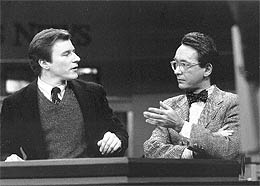On May 27, 1986, KIRO Television introduces a new feature on its 6:30 p.m. newscast: brief Point-Counterpoint exchanges between conservative organizer John Carlson (b. 1959) and left-wing writer Walt Crowley (1947-2007). The mini-debates air two or three times a week and cover a range of political and social topics. The series will end after more than 700 engagements in February 1993.
Opposites Attract
KIRO news director John Lippman approached John Carlson about the program idea in the summer of 1985. He recommended Walt Crowley for his opponent. On Halloween 1985, the two taped a rehearsal debate on economic sanctions against South Africa's Apartheid system (Carlson anti, Crowley pro). A number of other commentators on both sides of the political spectrum were also auditioned. KIRO initially selected Seattle Weekly publisher David Brewster to debate Carlson, but he dropped out before the segment's debut. Crowley then took the seat on the Left.
Carlson earned his conservative credentials as a founder of the Washington Spectator on the University of Washington campus and at the right-wing Washington Institute Foundation, which he founded. Crowley was a veteran of the New Left and Seattle's underground newspaper Helix in the 1960s, ran little city halls and Community Development Block Grant planning for Seattle mayor Wes Uhlman (b. 1935) in the 1970s, and served as policy director of the Seattle-King County Municipal League in the mid-1980s.
The Point-Counterpoint segments, which averaged three minutes each, usually aired twice each week, and were variously refereed by KIRO anchors Gary Justice, Susan Hutchison, and Aaron Brown. The live exchanges combined brief scripted arguments with unrehearsed give and take. Carlson and Crowley sparred a total of 722 times until February 7, 1993. Crowley quit amid KIRO's brief, disastrous experiment with a new "out of the box" news format. Attempts to find a new opponent for Carlson failed and the segment was not revived.
After KIRO, Carlson became an op-ed columnist at The Seattle Times and a popular "hot talk" show host on KVI AM radio. He advised sponsors of the "three strikes, you're out" initiative mandating life terms for chronic felons, and Tim Eyman's early campaigns to roll back motor-vehicle excise taxes. He later coordinated the succussful anti-affirmative action Initiative 200 in 1998 and won the September 2000 Republican nomination for governor. After losing to incumbent Gary Locke (b. 1950), he resumed his broadcasts and spearheaded the unsuccessful Initiative 912 effort to repeal transportation taxes in November 2005. In spring 2006, he shifted to KOMO AM radio for joint appearances with liberal commentator Ken Schram.
Meanwhile, Crowley wrote a memoir of the 1960s in Seattle, prepared histories of the Rainier Club, Metro Transit, and Group Health among other institutions, and authored the National Trust for Historic Preservation's official guide to Seattle landmarks. He served as a speech writer to Governor Mike Lowry (b. 1939) and adviser to Mayor Norm Rice (b. 1943) and other other public officials and political campaigns. He was appointed to the City of Seattle Landmarks Preservaiton Board and Washington State Council on Historic Preservation. In 1997, Crowley founded HistoryLink.org, the online encyclopedia of Washington state history, with his wife and graphic designer Marie McCaffrey and historian Paul Dorpat. Crowley served as HistoryLink's president and executive director until his death in 2007.

